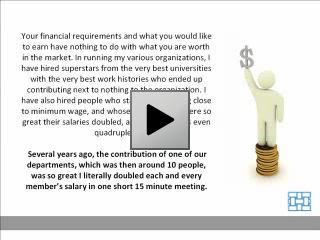total jobs
On SellingCrossing
221,126
new jobs this week
On SellingCrossing
16,587
total jobs
on EmploymentCrossing network available to our members
1,472,991
job type count
On SellingCrossing
- Sales Associate (38,067)
- Business Sales (29,980)
- Sales Coordinator (26,082)
- Financial Sales (23,848)
- Sales Management (20,911)
- Sales Marketing (17,961)
- Sales Manager (15,015)
Daily Job Search Video by Employment Potentials
By Harrison Barnes
A. Harrison Barnes, CEO of Employment Research Institute, discussed the relationship between your contribution at work and your paycheck.
Harrison firmly believes that your worth in the job market does not depend on what your financial obligations are or the amount of money you would like to take home; it is dependent on how significantly you can contribute to the bottom line of your company.
He says that that when you begin work at a company, it does not matter whether you come from a top university, whether your work history is among the best ones in the company, or whether you have a lot of expenses to cover at home. What matters is how beneficial you are to the company, how much business you bring in, and how much money you can save for the company by improving work efficiency.
In general, your financial requirements are not a concern for the company unless you are truly indispensable. Your paycheck depends on your ability to generate value for your employer, and typically, the value generated has to be far greater than your salary. That is, your contribution should be at least three times the money that you intend to take home every two weeks.
Therefore, if you want a raise, instead of informing your employer of your increased expenses, take initiative and work harder. Contribute more and make yourself indispensable. This will automatically encourage your employer to reward you without your even mentioning it.
If You Want to Earn More, You Need to Be Worth More
By Harrison Barnes
A. Harrison Barnes, CEO of Employment Research Institute, discussed the relationship between your contribution at work and your paycheck.
Harrison firmly believes that your worth in the job market does not depend on what your financial obligations are or the amount of money you would like to take home; it is dependent on how significantly you can contribute to the bottom line of your company.
He says that that when you begin work at a company, it does not matter whether you come from a top university, whether your work history is among the best ones in the company, or whether you have a lot of expenses to cover at home. What matters is how beneficial you are to the company, how much business you bring in, and how much money you can save for the company by improving work efficiency.
In general, your financial requirements are not a concern for the company unless you are truly indispensable. Your paycheck depends on your ability to generate value for your employer, and typically, the value generated has to be far greater than your salary. That is, your contribution should be at least three times the money that you intend to take home every two weeks.
Therefore, if you want a raise, instead of informing your employer of your increased expenses, take initiative and work harder. Contribute more and make yourself indispensable. This will automatically encourage your employer to reward you without your even mentioning it.
Testimonial of the Week
- Roberto D Seattle, WA
Sign Up now
Only SellingCrossing consolidates every job it can find in the domain and puts all of the job listings it locates in one place.
- We have more jobs than any other job board.
- We list jobs you will not find elsewhere that are hidden in small regional publications and employer websites
- We collect jobs from more than 4,429,376 websites and post them on our site.
- We are private, and therefore far fewer people are applying for the jobs on our site than are applying for those on public job boards.

